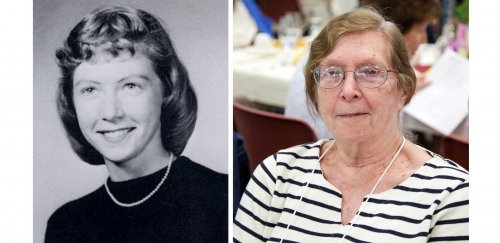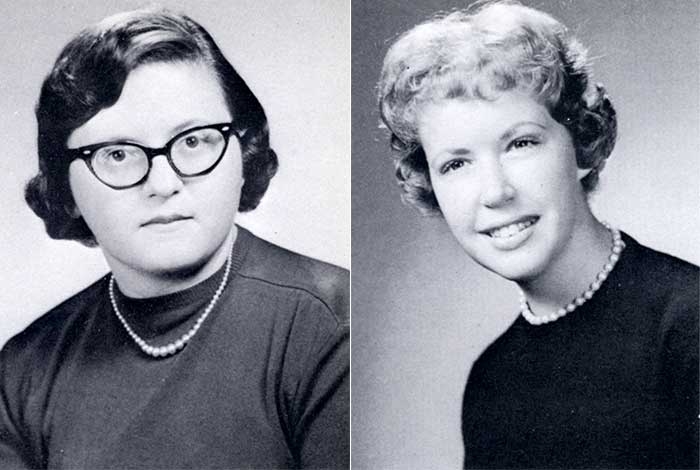RIC Alumnus Revisits the ’60s at Golden Reunion
- News & Events
- News
- RIC Alumnus Revisits the ’60s at Golden Reunion

Dolores Caranci Voccola ’60
On June 2 more than 100 alumni, representing the Classes of 1933 to 1962, gathered for the annual Golden Years Reunion at Rhode Island College.
Organized by RIC Director of Alumni Affairs Suzy Alba, with a greeting by RIC President Frank D. Sánchez, the event was held in Donovan Dining Center, where alumni were treated to a buffet luncheon.
Seated at tables draped in white linen, gold tableware and centerpieced with flowers, alumni settled back and revisited old times.
“I remember when the college relocated from downtown Providence to the Mount Pleasant campus in 1958,” remarked Dolores Caranci Voccola, Class of 1960. “I spent two years at the old campus and another two years at the new location. Both campuses were small, so you knew everybody. It was the smallness of the school that allowed us to bond, and that’s what I loved most about the college.”
Voccola earned her bachelor’s degree in early childhood education. “It was a teacher’s college,” she said. “Everyone earned a teaching degree.” But that would soon change.
In 1960 the Rhode Island College of Education was officially renamed Rhode Island College, reflecting its expanded role from a teacher’s college to a college that offered general education and degree programs in the liberal arts and sciences. Nine new buildings would be erected in the ’60s, including the first dorms.
It would become a decade of change and of defying convention not only for RIC but for the country. The youth of the ’60s would be the generation that worked to change the world by mass protests against the Vietnam War and by social movements on behalf of civil rights and women’s rights. It was also an era when the hippie counterculture, which began in California, would spread throughout the country from the mid-sixties onward.

By 1961 the spirit of change had also infused Voccola. After teaching for a year in Rhode Island, she and two of her classmates – Natalie Alviti Bielawski ’60 and Pat Fay Jarbeau ’60 – left their jobs, piled into a Pontiac and took off for California without any job prospects.
Why California? Voccola shrugged and replied, “Why not?”
And her parent’s reaction? “We didn’t ask our parents. We just told them we were leaving.” It was the tone of the 60s, a time of eschewing tradition and inventing one’s future. The three women drove more than 3,000 miles to the West coast. Voccola would turn 22 on the road.
“My father had given me the family car – a copper Pontiac. We loaded it with all of our possessions,” she said. “In those days Pontiacs were huge. They were so wide that the three of us could fit in the front seat. We loaded the back, floor to ceiling, with our suitcases.”
Unable to find teaching jobs in San Francisco, the women drove down the California coastline to the Mexican border and rented an apartment on the beach.
“From there, we went looking for jobs,” she said. “Natalie was hired first. Pat and I drove back up the coast and stopped at a city called Encinitas, where they hired us. We were in different schools, though. Same town, different schools, but we lived together and drove to work together.”
Voccola would teach in California for the next five years. By the time she returned to Rhode Island, she would find teaching jobs plentiful as a result of the baby boom and go on to teach for more than 30 years.
“I loved every moment,” she said, “and since retiring I have volunteered in my daughter’s classroom at Thornton Elementary School in Johnston and at my grandson’s school. My years in the classroom were truly ‘my golden years.’”
Today RIC continues to educate Rhode Island’s teachers, supporting future generations and the Rhode Island economy. At the Golden Reunion, Sánchez toasted alumni in celebration of the past, of what the college has become and what it will be in the future.
